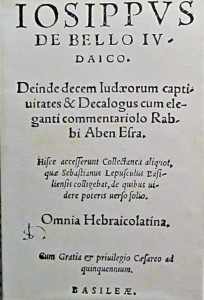 Excerpted from Lawrence H. Schiffman, From Text to Tradition, Ktav Publishing House, Hoboken, NJ, 1991.
Excerpted from Lawrence H. Schiffman, From Text to Tradition, Ktav Publishing House, Hoboken, NJ, 1991.
Most of what we know about Jewish history in the era of the revolt and the Hasmonean dynasty is known from the works of the historian Josephus. He was born in 37/38 C.E. to a priestly family. After acquiring an excellent education in Jerusalem, he tells us, he studied in the schools of the Pharisees, Sadducees, and Essenes, and then with a desert hermit named Bannus. When he returned to Jerusalem at nineteen, he took up the approach of the Pharisees. In 64 C.E. he was sent to Rome to secure the release of certain priests imprisoned by the procurator. During the war against Rome he served as commander of the Galilee, where he was unsuccessful, either because he only half- heartedly supported the revolt or for objective military reasons. After his surrender he took the side of the Romans, later claiming that he had believed that only some form of accommodation could end the ill-advised war and save the nation and its Temple from destruction. When the war ended he went to Rome. There he received from Vespasian a place to live, Roman citizenship, a pension, and lands in Judea. He must have died around 100 C.E.
There are some important things to keep in mind about Josephus as a historian. First, he did not in fact author most of what his works preserve. The great bulk of it comes from various sources, including Jewish materials, documentary evidence (some forged), and some of the best-known historians of Antiquity, which he compiled, sometimes even slavishly, ignoring contradictions with his own words or with his other sources. Second,
he had a specific ax to grind. He sought to demonstrate to the Jews that life under Rome was not so bad as long as religious freedom was guaranteed. He also wanted to show the Romans that the war had been brought about by a minority of the Jews and had not reflected the attitude of the people at large. This was certainly one of the main functions of his Jewish War, written toward the end of Vespasian’s reign, between 75 and 79 C.E. He also attempted to relate the story of the war as if he had not been among those to blame for its failure. This is especially evident in his Life, a work which cannot be precisely dated. His Antiquities of the Jews, completed in 93 or 94 C.E., is a history of the Jews from earliest times to the end of the first century C.E. This work also has a purpose, to show the hoary antiquity and, hence, legitimacy of the Jews and Judaism within the Greco-Roman world. In his Against Apion, written after Antiquities, the purpose is to respond to anti-Semitic propaganda and to maintain that Jews had not set themselves apart from the human race by their religion, as their enemies alleged, and did not believe the ridiculous things often attributed to them.
Josephus’s works, written in Greek (one may originally have been composed in Hebrew or Aramaic) served to educate both Greek-speaking Jews and non-Jews about the nature and history of the Jews and Judaism. These books were quickly lost to the Jewish people, as assimilation and conversion to Christianity led to the decline of the Greek-speaking Jewish community whose members would have read Josephus’s works. In the Middle Ages some of his writings circulated again in the form of the book of Josippon, a medieval Hebrew translation of a Latin adaptation. Without Josephus, the entire Herodian period and the story of the Great Revolt would be, historically speaking, virtually unknown.
